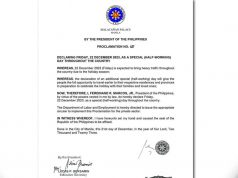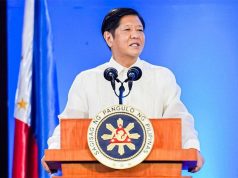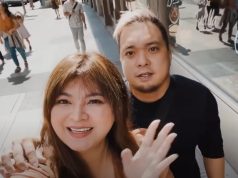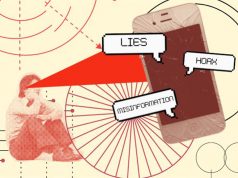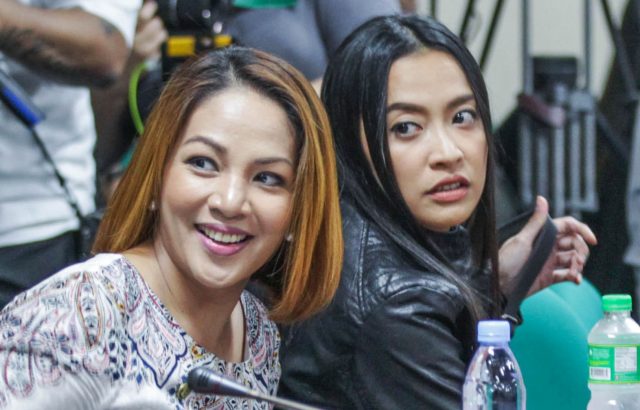
MANILA, Philippines – (UPDATE2, 4:45 P.M) Because the law does not allow government personnel to dissociate from their official identities, Senator Nancy Binay told Communications Assistant Secretary Margaux “Mocha” Uson “it’s high time for you to decide if you want to be a blogger or an asec.”
Uson, who has used her substantial social media following to both support President Rodrigo Duterte and to attack his critics and other perceived foes, including mainstream media, showed up with fellow officials of the Presidential Communications Operations Office (PCOO) at the hearing into “fake news” on Wednesday, October 4, by the Senate committee on public information and mass media chaired by Senator Grace Poe.
Also attending was another pro-administration social media personality, Rey Joseph Nieto, who is behind the blog “Thinking Pinoy” and is now a consultant of the Department of Foreign Affairs.
During the hearing, Binay cited Republic Act 6713 or the Code of Conduct and Ethical Standards for Public Officials and Employees and said as government officials, “we cannot use the excuse of doing things in our private capacities.”
“At this point hindi mo puwedeng ihiwalay yung pagiging blogger mo sa pagiging Asec mo (You cannot dissociate your being a blogger from your being an Asec),” Binay pointed out to Uson before asking her to decide which she wants to be.
Instead of doing so, Uson said she was “exercising my right to freedom of expression and speech.”
Earlier, Uson, who slammed media for producing and spreading “fake news,” claiming she herself had been a victim of this and that her side on issues had never been sought, was engaged in an exchange by Senator Paolo Benigno Aquino IV. Aquino asked her if she, as a blogger, had ever sought the side of the Senate minority when criticizing them.
“Blogger po ako, hindi po ako journalist,” Uson replied, implying that she considered blogging held to a lower standard of accountability.
When Aquino pressed her on the issue, she refused to answer, claiming she had the right to do so and subsequently invoked her right against – at this she stumbled and said, “self-discri . . . ” before saying the correct phrase “self-incrimination.”
It was pointed out to her that she could only invoke this right if she was accused of committing a crime.
Senator Juan Miguel Zubiri cut in, cautioning against “embarrassing” resource persons but Aquino pointed out that the resolution on which the hearing was based “talks of grievances” and could not, therefore, be limited to the gripes of a few “because we should talk of fake news in general.”
But when asked again by Aquino whether she had sought the side of the minority or not, Uson evaded the question insisting that “karapatan po ng blogger ‘yun kung hingin ang side ng isang tao (It is the blogger’s right to get the side of a person or not)” because a blog is “opinion-based.”
‘Untenable’ – mixing private blog with govt job
Later in the hearing, the matter of the murky delineation between Uson’s government official persona and what she insists is a private blog was tackled again.
Poe asked InterAksyon editor in chief Roby Alampay for his view and the latter used one word to describe Uson’s situation: “untenable.”
Poe asked the private media groups for their policies on allowing employees to maintain private social media accounts while the media outlet has its own official accounts. Alampay said employees retain their individual freedom of expression in their private accounts, but noted that this policy was easier to define in a private company but not in government, as the situation of Uson illustrates.
GMA online editor in chief Jaemark Tordecilla weighed in and said “the question of resources” needed to be considered. To illustrate, he wondered aloud, “who’s paying for her [Uson’s] trip” when she, say, posts material on what she calls her personal asset, but the material was derived in the course of her government work.
Senator Binay, interviewed later by reporters, underscored the need to clarify the issue: “‘Yong linya between a government official at saka ‘yong blogger. Ang hirap paghiwalayin nung dalawa [The line between the government official and blogger. It’s hard to separate the two].”
Asked whether a blogger who is at the same a government official is not bound by some rules, Binay replied: “Ay, hindi. Ako, kailangan magdesisyon ka. Blogger ka ba o government (official)? For example, ‘pag abogado ka nga, you are required to not practice your profession. Baka may ganong pangangailangan na hindi mo na i-practice ‘yong profession mo.”
[In my view, you should decide. Blogger or government official? Lawyers, for example, are not allowed to practice their profession while in office. There might be a need to make that restriction on practice more explicit to others].”
Standards for bloggers
In the hearing, Poe also asked the PCOO to submit the duties and functions of its officials.
She then cited a new article quoting Communications Secretary Martin Andanar as saying bloggers should follow the same code of ethics as journalist.
Assistant Secretary Ana Maria Banaag quickly corrected Poe and said, that was “his [Andanar’s] opinion but it’s not a policy.”
However, interviewed later by Senate reporters, Binay weighed in on the issue and supported the notion of holding bloggers to similar standards as journalists, such as a code of ethics of journalists.
Binay said, “Syempre naman. Lalo na kasi minsan nga mas marami pang followers ‘yong bloggers kaysa doon sa mainstream [Of course, bloggers should be held to those standards, especially since some bloggers have much bigger following than mainstream media].”
Uson has herself been accused of spreading fake news and has been sued for libel by Senator Antonio Trillanes IV for posting details of the lawmaker’s purported offshore accounts, which he has since disproved.
These details were later used by Duterte against Trillanes.




